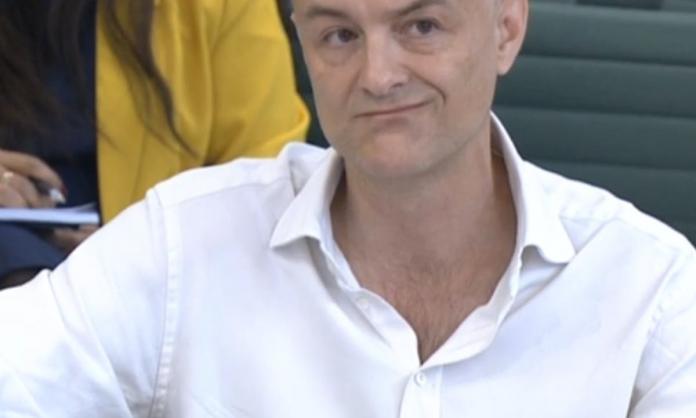If the last year and a half has been a dark crime thriller, this week was the bit where the evil villain explains in excruciating detail how he (or in this case his boss) committed mass murder.
Dominic Cummings, former chief adviser to UK Prime Minister Boris Johnson, has confirmed almost all the far left’s arguments in his seven hours of evidence about the handling of the pandemic given to a joint parliamentary committee meeting on 26 May. He confirmed: that the UK government cared more about the effects of the virus on profit rates than on human lives; that prioritising the survival of business meant none of the infrastructure required to save lives was properly established; that Johnson was willing to “let the bodies pile high”; and that, despite all the stereotypes about the individualism and greed of working-class people, a sense of collective responsibility for public health was widespread—a fact the Johnson government eventually had to factor into its calculations.
Until last November, Cummings was one of the most powerful people in the UK. He had access to every key government meeting about the pandemic. He explained that, from day one, “Not just the prime minister but many other people thought that the real danger is not the health danger, but the overreaction to it and the economy. The prime minister said all the way through February and through the first half of March ‘The real danger here isn’t this new swine flu thing, it’s that the reaction to it is going to cripple the economy’”.
By 5 March 2020, according to Cummings, “The logic was; well obviously we’re not going to be closing pubs and closing retail, closing leisure and all this”. One month later, 5,871 people had died of COVID-19. The public health system became so overwhelmed by the growing number of cases that patients were treated in hospital car parks. More than 127,768 have died so far.
And yet, for months, “herd immunity” was the key strategy pursued by the UK government. Cummings told the inquiry that “on the 12th [of March] we’re sitting in the prime minister’s office. We’re talking about the herd immunity plan. The cabinet secretary said, ‘Prime Minister, you should go on TV tomorrow and explain to people the herd immunity plan and that it’s like the old chicken pox parties’”.
Let it rip was the official thinking. “Essentially, the logic of the official plan from the Department of Health was that this disease is going to spread”, described Cummings. “It was seen as an inevitability.” Except it was not an inevitability. The focus on the needs of business meant that the very real measures which could have stemmed the tide were not introduced or adequately planned for.
As Cummings repeatedly pointed out, a lockdown could have been imposed far earlier. But this isn’t all: border controls could also have been implemented, the NHS could have been provided with far more resources, and assistance could have been provided to those needing to isolate. Instead, the Department of Health was “turning down ventilators because the price had been marked up”, and proper compensation was not provided to support people isolating because “like on testing, like on shielding, there was no plan”. When it came to protecting the elderly, Cummings revealed, “Not only was there not a plan but lots of people in the cabinet office said we shouldn’t have a plan. We shouldn’t have a helpline because it’ll all just be swamped.”
Since Cummings’ testimony, UK Health Secretary Matt Hancock has admitted that some hospital patients with COVID-19 were released into care homes. Between March and June 2020, around 20,000 people reportedly died of the virus in care homes.
Even after the first lockdown, Johnson was furious at the thought of having another. “I should have been the mayor of Jaws and kept the beaches open”, the prime minister joked, according to Cummings.
Early decisions about the pandemic were based on assumptions about working-class people’s willingness to cooperate. “One of the critical things”, explained Cummings, “that was completely wrong in the whole official thinking in SAGE [Scientific Advisory Group for Emergencies] and in the Department of Health in February, March, was the British public will not accept a lockdown. Secondly, the British public will not accept what was thought of as a kind of east Asian-style track-and-trace type system and the infringement of liberty around that ... Those two assumptions were completely central to the official plan and were both, obviously, completely wrong.”
Unlike the wealthy and powerful for whom the economy is the priority, working-class people have and have demonstrated an appreciation of what is in the collective good. They have a basic sense of solidarity. Even decades of neoliberalism, with its ideological focus on the individual, have not been able to stamp this out. Eventually, the government had to reckon with this fact.
The first lockdown decision was the result of a recognition that, if the government refused to introduce a lockdown, “The public will lock themselves down, because they’ll realise there isn’t going to be any NHS for anybody. There’s gonna be a lockdown, whatever happens”.
It was this understanding that later led the government to introduce schemes to encourage people to go out and spend money. The “Eat Out To Help Out” scheme, which started in August 2020, gave people financial incentives to spend money in hospitality businesses. This scheme contributed to another spike in cases—yet another instance of sacrificing public health for the good of business.
Cummings’ testimony vindicates the central arguments of the socialist left during the pandemic. The enormous death toll was not inevitable, but a consequence of putting profits before lives. And the social responsibility and solidarity that working class people have demonstrated over the course of the pandemic show that a genuinely democratic society could do a better job of protecting people from COVID-19 than one run by criminals like Johnson.











